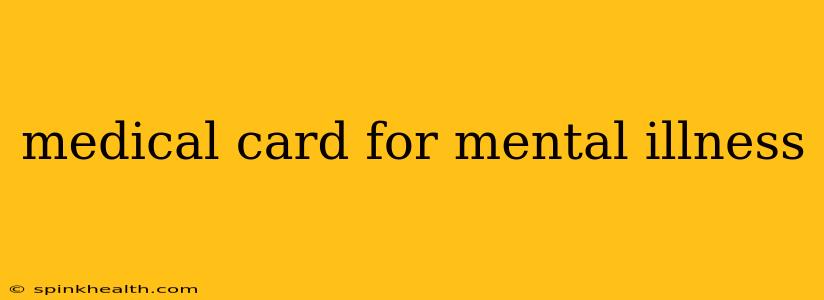Navigating the World of Mental Health Cards: Accessing Support and Understanding Your Rights
The journey with mental illness can be challenging, and navigating the healthcare system can add another layer of complexity. Many people wonder about "medical cards" specifically for mental illness, and the truth is, there isn't one single, universally recognized card. The situation is nuanced, varying significantly based on location, insurance coverage, and the specific type of support needed. Let's unravel this and explore what options are available to help you access the care you deserve.
This isn't a simple yes or no answer. It's a story about accessing help, understanding your options, and advocating for yourself. Let's begin.
What is a "medical card" in the context of mental health?
The term "medical card" is quite broad. It's often used interchangeably with health insurance cards, proof of enrollment in a mental health program, or even simply a record summarizing diagnoses and treatments. There isn't a physical card specifically designed for mental illness that grants access to services like a driver's license grants driving privileges. Instead, access hinges on insurance coverage, state or regional programs, and the specific services required.
How can I access mental healthcare services?
This is the core question, and the answer depends heavily on your location and circumstances. Your options generally fall into these categories:
-
Health Insurance: Most health insurance plans, including those offered through employers or government programs like Medicaid and Medicare (in the US), cover mental healthcare. Check your policy details carefully to understand your coverage, including the specific types of therapy, medications, and facilities covered. Your insurance card acts as your "medical card" in this case, granting access to services within your plan's network.
-
State and Regional Programs: Many states and regions offer public mental health programs providing services to individuals regardless of their insurance status. These programs may involve specific eligibility criteria based on income, disability, or the severity of the mental illness. You'll receive documentation from these programs confirming your enrollment and allowing you to access services.
-
Private Pay Options: If insurance is insufficient or unavailable, private pay options exist for therapy and medication. However, these can be costly. Explore options such as sliding-scale fees offered by some therapists.
Do I need a specific diagnosis to get mental health care?
No, you don't necessarily need a formal diagnosis to access mental healthcare services. Many therapists and counselors offer support and guidance without requiring a specific diagnosis from a psychiatrist or other medical professional. While a diagnosis might be necessary for insurance coverage or certain specialized programs, it's not a prerequisite for seeking help. The important thing is reaching out and seeking support.
What kind of documentation will I need?
The necessary documentation depends on the specific service and provider. Generally, you'll need to provide identification, proof of insurance (if applicable), and possibly referral information from a primary care physician. For some programs, proof of income or disability might be required.
How can I find mental health resources in my area?
Finding mental health resources often begins with an online search using keywords like "mental health services [your city/state]," "mental health clinics near me," or "psychologists near me." Your primary care physician can also offer referrals, as can local community organizations or support groups. Remember, seeking help is a sign of strength, and numerous resources are available to guide and support you.
This journey towards mental wellness is personal, and accessing the right resources is crucial. Don't hesitate to explore the options available and advocate for your needs. Remember that help is available, and taking that first step is the most significant achievement.

